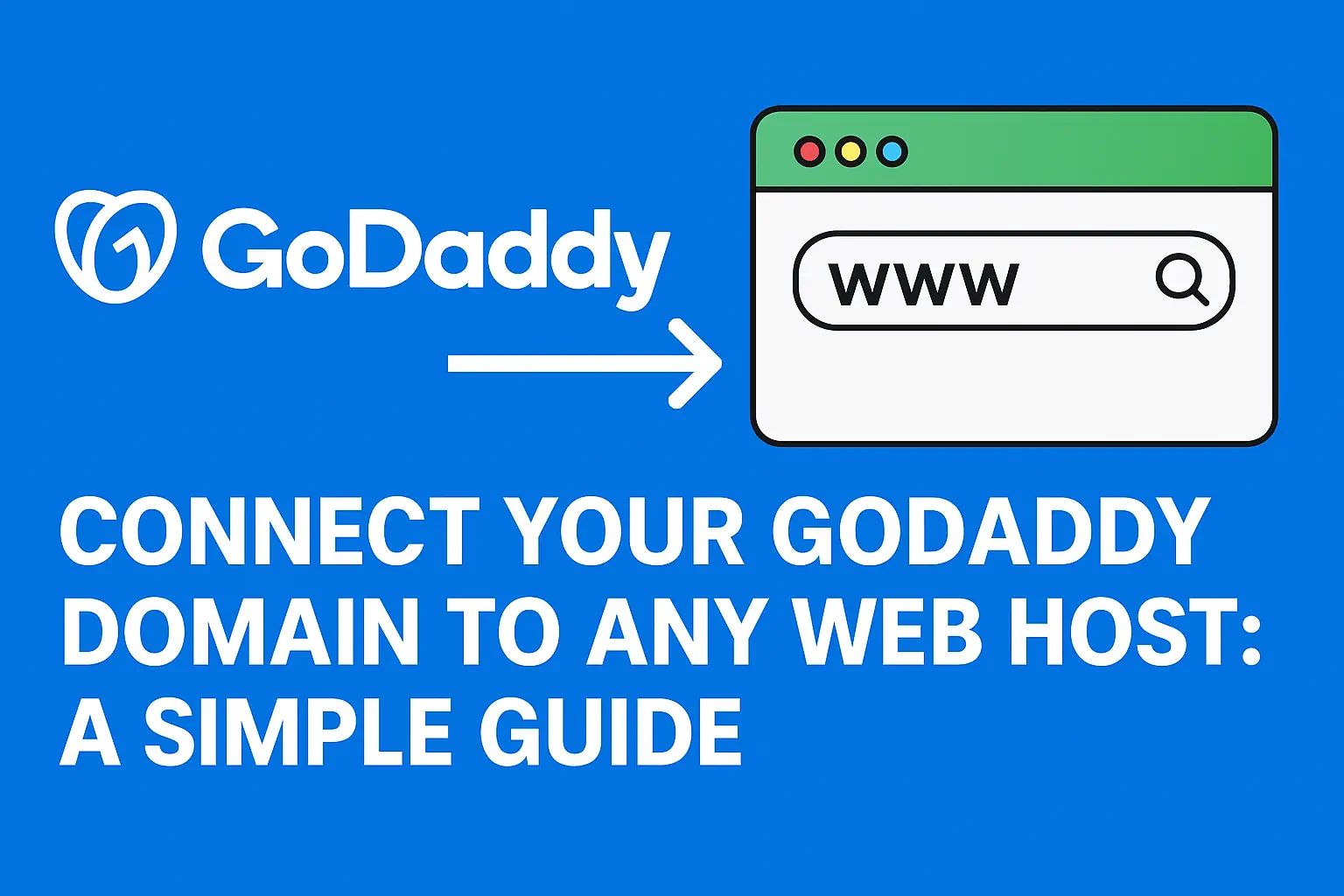Starting a new website or blog is always exciting. But when it comes to linking your domain name to web hosting, things can feel a bit confusing especially if you’re new to the process.
If you’ve bought your domain from GoDaddy and your hosting is with another provider like Hostinger, Bluehost, or SiteGround, don’t worry. This guide is written just for you.
We’ll walk you through everything in simple, everyday language from what a domain and hosting are, to how DNS and nameservers work. By the end, your website will be connected and ready to go live.
What is a Domain and Hosting?
Before jumping into the steps, let’s quickly understand the basics.
- Domain: This is your website’s address on the internet, like
yourwebsite.com. Think of it like your home address. - Hosting: This is where your website lives — the actual space where all your files, images, and content are stored. It’s like your house.
For your website to work, your domain (the address) needs to be connected to your hosting (the house).
Why Do You Need to Connect Domain to Hosting?
If your domain is with GoDaddy and hosting is with another provider, your site won’t work until you connect them. Why?
Because your domain needs to “tell” the internet where your website is hosted. Without this connection, visitors can’t find your site — even if everything else is set up.
What You’ll Need
To complete this setup, make sure you have:
- A domain purchased from GoDaddy
- A web hosting account (like Hostinger, Bluehost, or SiteGround)
- The nameservers from your hosting provider
- Access to your GoDaddy account
Step-by-Step Guide: How to Connect GoDaddy Domain to Hosting
Let’s walk through the process step by step:
Step 1: Log in to Your GoDaddy Account
Go to www.godaddy.com and click Sign In. Enter your username and password. Once logged in, go to the My Products section to find your domain.
Step 2: Select Your Domain
Find the domain you want to use (like myblogsite.com) and click the DNS button next to it. This will take you to the DNS Management page.
Step 3: Get Nameservers from Your Hosting Provider
Now go to your hosting provider’s dashboard or check your welcome email. You’ll find two nameservers there — they usually look like this:
- Hostinger:
ns1.dns-parking.com,ns2.dns-parking.com - Bluehost:
ns1.bluehost.com,ns2.bluehost.com - SiteGround:
ns1.siteground.net,ns2.siteground.net
Copy these nameservers. You’ll need to paste them in GoDaddy.
Step 4: Update Nameservers in GoDaddy
Go back to the DNS Management page in your GoDaddy account. Scroll down to the Nameservers section and click Change.
- Choose Enter my own nameservers (advanced)
- Paste the two nameservers you copied earlier
- Click Save
That’s it! Your domain is now pointing to your hosting provider.
Step 5: Wait for DNS Propagation
After saving, the changes take time to fully update across the internet. This process is called DNS propagation, and it usually takes anywhere from 30 minutes to 2 hours, but in some cases, it can take up to 24–48 hours.
During this time, your site might not load — this is completely normal.
To track the progress, visit dnschecker.org.
What to Do After Connecting the Domain
Once your domain is connected to hosting, here are a couple of next steps:
1. Add the Domain in Your Hosting Dashboard
Log in to your hosting control panel. Go to Domains, Websites, or Add Domain section. Add your GoDaddy domain (like myblogsite.com). If it asks for a root folder, select one or leave it as default.
2. Install WordPress (Optional)
If you want to build your site using WordPress:
- Go to your hosting dashboard
- Use the Auto Installer or 1-Click Installer
- Choose WordPress and fill in the website name, username, and password
- Click Install
Once installed, you can log in to your site at yourdomain.com/wp-admin.
Common Issues and How to Fix Them
| Issue | Solution |
|---|---|
| Website not loading | Wait for DNS propagation to finish |
| Incorrect nameservers entered | Double-check and re-enter them carefully |
| Typo in domain name | Make sure your domain name is spelled correctly |
| SSL not working | Activate SSL from your hosting control panel |
| Still seeing GoDaddy placeholder | Clear your browser cache or wait a bit longer |
FAQs: Connecting GoDaddy Domain to Hosting
Q1: Can I use GoDaddy hosting instead?
Yes. If you bought both the domain and hosting from GoDaddy, they’re usually connected automatically — no extra steps needed.
Q2: What if I’m using Blogger or Shopify instead of a traditional host?
In that case, don’t change the nameservers. You’ll need to add A Records or CNAME instead. GoDaddy has detailed guides for that.
Q3: Can I change the settings later?
Absolutely. You can update your domain’s nameservers anytime through the DNS management section.
Q4: Does it cost anything to connect domain to hosting?
No. It’s free. You just need an active domain and hosting account.
Final Thoughts: You’re Ready to Go Live
Linking your GoDaddy domain to your hosting provider may seem technical at first, but it’s actually quite simple once you understand the steps.
Once everything is set and DNS propagation is complete, your website will be live and ready for the world. From here, you can start customizing, adding content, or building your online store or blog.
Pro Tip: Bookmark this guide for future reference — or share it with friends who are just getting started.
Still have questions about the process? I’m here to help.

